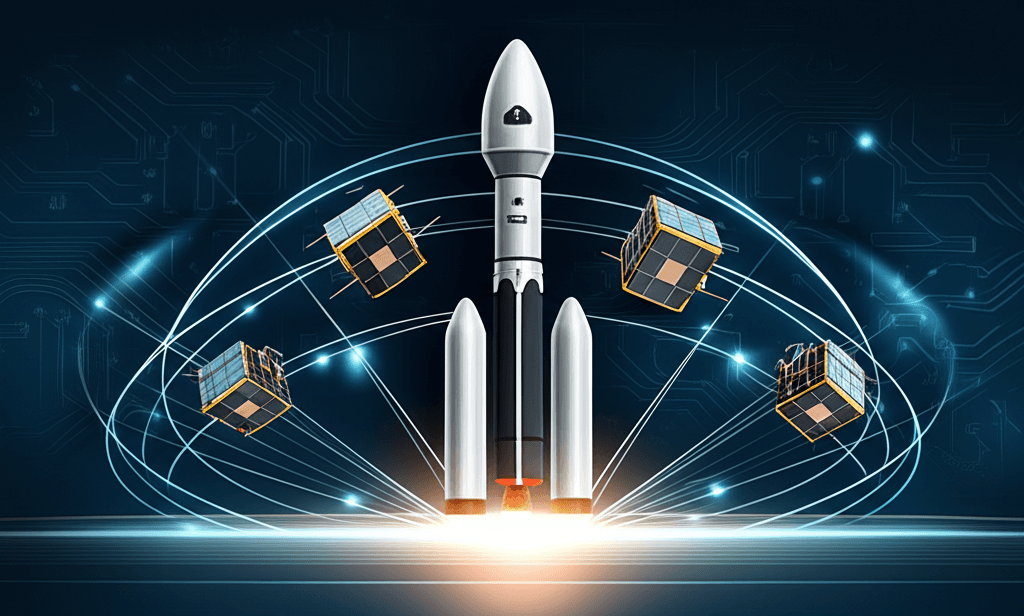HAL Secures ISRO SSLV Rights, Propelling India's Commercial Satellite Launches
HAL's historic SSLV contract transforms India's space sector, empowering private industry for global small satellite launches.
June 20, 2025

In a landmark move for India's burgeoning commercial space sector, state-owned aerospace and defense giant Hindustan Aeronautics Limited (HAL) has secured the contract to manufacture the Small Satellite Launch Vehicle (SSLV), a rocket developed by the Indian Space Research Organisation (ISRO). HAL won the rights with a bid of ₹511 crore, marking a pivotal moment in the nation's strategy to increase private industry participation in its space program.[1][2] This transfer of technology, the first of its kind for a launch vehicle in India, empowers HAL to not only build the SSLV but also to market and conduct commercial launches, positioning the company as a key player in the rapidly growing global small satellite market.[3][4][5] The decision was announced by the Indian National Space Promotion and Authorisation Centre (IN-SPACe), the regulatory body tasked with promoting and authorizing private space activities in the country.[1][2]
The selection of HAL concludes a competitive bidding process that saw it emerge as the standalone winner against two other consortia.[1] One consortium was led by Alpha Design Technologies, a unit of Adani Defence Systems and Technologies, and included Agnikul Cosmos and Walchand Industries.[2][6] The other was fronted by the state-backed Bharat Dynamics Limited, in partnership with Skyroot Aerospace, Keltron, and BHEL.[2][5] HAL's successful solo bid underscores its extensive experience and established infrastructure in aerospace manufacturing. The company has been a long-standing partner of ISRO, supplying critical components, structures, and propellant tanks for its flagship launch vehicles like the Polar Satellite Launch Vehicle (PSLV) and the Geosynchronous Satellite Launch Vehicle (GSLV).[7][8] This new agreement, however, represents a significant evolution in their relationship, moving HAL from a component supplier to an end-to-end service provider for satellite launches.[5]
The SSLV is a crucial asset in India's space ambitions, designed specifically to cater to the on-demand launch of small satellites.[9][3] These satellites, weighing up to 500 kg, are increasingly used for a variety of applications, including Earth observation, communications, and research, forming a significant and expanding segment of the global space economy.[3][10] The SSLV's key advantages are its low cost, quick turnaround time, and minimal launch infrastructure requirements, making it an ideal platform for both domestic and international customers.[9][11] The rocket is a three-stage vehicle with all solid propulsion stages and a liquid-fueled velocity trimming module for precise satellite deployment.[12] After a challenging initial flight, ISRO has conducted successful developmental launches, declaring the vehicle ready for commercial production and technology transfer.[9][13] This move is strategically timed to capitalize on the projected growth of India's satellite launch market, which is estimated to expand significantly by 2033.[14][15]
The technology transfer process will be managed by IN-SPACe and NewSpace India Limited (NSIL), ISRO's commercial arm.[2] Over the next two years, ISRO will provide comprehensive guidance and technical support to HAL, a process that includes hand-holding the company through the manufacturing of its first two SSLVs.[16][6] This mentorship period will ensure that HAL fully absorbs the complex technology and operational expertise required for successful launches.[3] Following this initial phase, HAL will have the autonomy to enhance the rocket's design and establish its own vendor ecosystem, fostering further innovation and cost-efficiency.[6][12] This structured handover is designed to create a robust public-private partnership model, a necessity for India to achieve its goal of capturing a larger share of the $44 billion global space economy projected for 2033.[2][5] The agreement also includes end-to-end capabilities, covering everything from design and manufacturing to integration, launch operations, and post-flight analysis.[17]
The implications of this contract extend far beyond HAL. It represents a fundamental shift in India's space policy, deliberately moving from a government-centric model to one that actively encourages and leverages the capabilities of the private sector.[18] By privatizing an entire launch vehicle program, India is aiming to replicate the success of its PSLV, which has become a reliable workhorse for launching satellites for international customers.[19] The commercialization of the SSLV is expected to significantly increase the frequency of launches from India, with HAL aiming to produce 6-10 rockets annually based on market demand.[4] This increased launch cadence will be supported by existing facilities at Sriharikota and the upcoming spaceport at Kulasekarapattinam, which is being developed specifically to support commercial launches.[9] The move is a clear signal of the government's commitment to creating a vibrant and competitive domestic space industry, attracting investment, and fostering innovation among a new generation of space-tech startups.[18][20]
In conclusion, HAL's successful bid for the SSLV technology transfer is a transformative step for India's space sector. It not only positions a seasoned public sector undertaking at the forefront of the commercial launch market but also catalyzes the development of a broader private space ecosystem.[1][5] This strategic decision to hand over a proven ISRO technology to a commercial entity is designed to make India a global hub for small satellite launches, offering competitive, reliable, and on-demand access to space.[2][21] As HAL prepares to transition from manufacturing aircraft to launching satellites, the move signals a new era of public-private collaboration that will be critical for India to achieve its ambitious goals in the final frontier and the growing artificial intelligence applications that rely on satellite data.
Sources
[5]
[10]
[11]
[12]
[14]
[16]
[17]